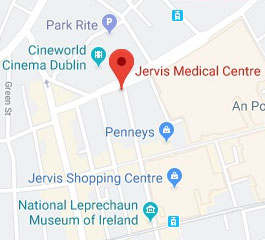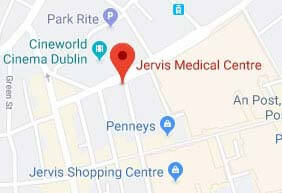Cervical Smear Tests in Dublin City Centre
A smear test can identify cell changes in the cervix before they become cancer cells. If these cells are not found and treated, they may become cancerous over time.
About the Cervical Smear Test
What is a smear test and how is it taken?
A smear test (sometimes called a pap test) is used for cervical screening. It is a simple procedure where a doctor or nurse (smeartaker) takes a sample of cells from the cervix (neck of the womb) to look for early changes on the cells of the cervix. A smear test can identify cell changes before they become cancer cells. If these cells are not found and treated, they could become cancerous over time.
Quite simply, having a regular smear test could save your life.
You lie on youryour back for your smear test. The doctor taking the test will gently insert an instrument called a speculum into your vagina to hold it open. The cervix is the area where the top of the vagina leads to the uterus (womb). The doctor or nurse will use a small, specialised broom to gently brush off a sample of cells from the cervix. This sample is sent to the laboratory to be checked.

A smear test is not a diagnostic test. It is not required for clinical investigation of fibroids, cysts, heavy or painful periods or pain during intercourse. A smear test is not used to detect any changes in the womb, the fallopian tubes or the ovaries. If you have any concerns about any of these issues you should speak to your GP or nurse.
Can abnormal cells be treated?
The types of treatments that are used include:
Cryotherapy – freezing the affected area of the cervix which destroys the abnormal cells.
Laser treatment – this destroys or cuts away abnormal cells.
Loop Diathermy – a thin wire loop cuts through and removes the abnormal area of cells.
These treatments are done as an out-patient and do not take long. They are usually successful and are usually needed only once. Follow up and regular screening tests are needed for the next few years check that the treatment has been successful. It takes a few weeks for the cervix to heal after treatment. Once it has healed, a normal sex life can be resumed. Treatments do not affect fertility.
When is the best time to have a smear test?
Who should have a smear test?
I am not sexually active; do I need a smear test?
What is CervicalCheck?
What is cervical screening?
How can I be part of the programme?
To be part of the programme, you can arrange a smear test appointment with any registered smeartaker of your choice. Thousands of GPs, practice nurses, Women’s Health, Family Planning and Well Woman Clinics all over Ireland are registered and you can see a full list in the ‘Find a Smeartaker’ section of this site. CervicalCheck also sends invitation letters to women who are on the CervicalCheck register. You can check that you are on the register in the ‘Check Your Registration/Eligibility’ section of this site. If you are not on the register you can add or update your personal details. If you have any questions you can call CervicalCheck on Freephone 1800 45 45 55.
Women who have already had a CervicalCheck smear test since the start of the programme in September 2008 will automatically be re-called by letter when their next smear test is due.
Women must sign the Cervical Cytology Form to take part in the programme and avail of a free CervicalCheck smear test. This allows CervicalCheck to receive, hold and use a woman’s personal details and information about her smear test sample. This may include post-smear samples and colposcopy results. The Cervical Cytology Form has an information sheet attached to it explaining the smear test process and why consent is needed. The information sheet is available to women in Polish, Arabic, Chinese (Mandarin), French, German, Irish, Latvian, Lithuanian, Romanian, Russian and Spanish.
What is the CervicalCheck register?
CervicalCheck has developed a Cervical Screening Register (CSR). This is a list of eligible women aged 25 to 60 from information received from the Department of Social and Family Affairs, from self-registration and colposcopy details.
The CervicalCheck register (list) is a secure electronic database that contains your name, address, date of birth and Personal Public Service Number (PPSNo.). The register (list) also records your smear test results and any related procedures that you might have had. Be assured that your information is secure. To maintain confidentiality, you will be given a unique identification number by the CervicalCheck register. To keep the register (list) up to date, please let us know if there is any change to your personal details such as name or address.
The Health (Provision of Information) Act 1997 allows CervicalCheck to get your name, address and date of birth so that we can invite you for regular free smear tests.
I have received an invitation letter, what do I do now?
How effective is the cervical screening test?
I have never had sex. Do I need a cervical screening test?
I have had a hysterectomy - do I need to have a cervical screening tests?
What is colposcopy?
Cervical Smear Test Results
The result of your test will be available from your smeartaker. CervicalCheck will send you a letter about your results within four weeks of your smear test. Most smear test results are found to be normal. Please try not to worry if you are called back for another test. For women who receive a not normal result, the doctor or practice nurse will explain the result and advise you of the recommended follow-up.
If your result is not normal you may need to have another free smear test or a more detailed examination of the cervix using a type of microscope. This test is called a colposcopy.
A colposcopy is free of charge as part of the CervicalCheck programme.
If you decide to be referred as a private patient using your private health insurance you will have to pay a fee. If there are cell changes on your cervix they can be easily treated to prevent them from developing into cancer cells.
NORMAL RESULTS
About 9 in 10 routine cervical screening tests are normal. You will be sent a letter inviting you for another one in 3-5 years. (Note: a normal result means you have a very low chance of developing cancer of the cervix – not a 100% guarantee that it will not occur.)
ADEQUATE RESULTS
This sometimes occurs. This simply means no result can be given. For example, if the smear method was used, an inadequate test may occur because there was some blood or too much mucus on the slide and the cells could not be seen properly. Sometimes it is because a smear of cells was too thick or too thin to assess properly. You will be asked to attend for a repeat test. However, with the newer liquid based cytology method, the number of tests that are ‘inadequate’ and need repeating is much less than with the traditional smear method.
ABNORMAL RESULTS
Some changes in the cells are found in about 1 in 10 tests. There is a range of changes that may occur. In nearly all cases, these changes do not mean cancer. Minor or borderline abnormal changes are quite common. These often clear away on their own and most mild changes do not progress to anything serious. However, any change needs to be monitored as some may progress to become more serious in the future. A repeat test after 6-12 months is commonly advised, depending on the type and degree of change. Often the changes will have gone when the test is repeated. If the changes do not go, or the changes are more marked, then a referral to colposcopy is advised. Rarely, a cancer of the cervix is diagnosed by a cervical screening test.



